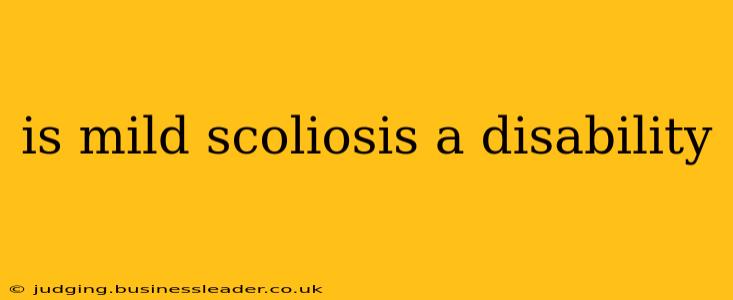Scoliosis, a sideways curvature of the spine, affects millions worldwide. While the severity of scoliosis varies greatly, a common question arises: is mild scoliosis considered a disability? The answer isn't a simple yes or no, as it depends on several individual factors. This comprehensive guide explores the nuances of mild scoliosis and its potential impact on daily life, helping you understand whether it might qualify as a disability in your specific case.
What is Considered Mild Scoliosis?
Mild scoliosis is generally defined as a Cobb angle of less than 25 degrees. The Cobb angle is a measurement used by doctors to quantify the degree of spinal curvature on an X-ray. Angles below 25 degrees are usually considered mild and may not require any treatment beyond observation. However, even mild scoliosis can still cause symptoms and affect an individual's life.
Can Mild Scoliosis Cause Disability?
While mild scoliosis often doesn't significantly impair daily functioning, it can in certain circumstances. The impact depends on various factors, including:
-
Individual Symptoms: Some individuals with mild scoliosis experience no symptoms at all. Others may experience back pain, fatigue, muscle imbalances, and even shortness of breath in more severe cases, although this is less common with mild curvatures. The presence and severity of these symptoms play a significant role in determining the potential impact on daily life.
-
Age of Onset: Scoliosis that develops in childhood or adolescence might have a greater impact on growth and development than scoliosis diagnosed in adulthood. Changes in the spine during growth spurts could exacerbate the curvature and lead to further complications.
-
Location of the Curve: The location of the spinal curvature can influence the impact on bodily functions.
-
Associated Conditions: The presence of other health conditions can exacerbate the effects of even mild scoliosis.
What are the Criteria for Disability Benefits Related to Scoliosis?
Determining whether mild scoliosis qualifies for disability benefits (such as Social Security Disability Insurance (SSDI) or Supplemental Security Income (SSI) in the US, or similar programs in other countries) involves a rigorous evaluation process. The focus isn't solely on the Cobb angle measurement but rather on the functional limitations it imposes. The following factors are generally considered:
-
Impact on Daily Activities: Can you perform basic daily activities such as walking, sitting, standing, and lifting objects without significant pain or limitations?
-
Ability to Work: Does your scoliosis prevent you from performing the essential functions of your job? This evaluation considers the physical demands of your occupation.
-
Medical Evidence: Comprehensive medical documentation, including X-rays, physical examination reports, and treatment records, is crucial. This evidence demonstrates the severity of your condition and its impact on your ability to function.
-
Expert Opinions: Opinions from medical professionals specializing in scoliosis are often necessary to support a claim for disability benefits.
Does Mild Scoliosis Qualify for Disability Accommodations in Education or Employment?
The criteria for disability accommodations are distinct from those for disability benefits. Under the Americans with Disabilities Act (ADA) in the US, or equivalent legislation in other countries, an individual with mild scoliosis could potentially qualify for reasonable accommodations if the condition substantially limits a major life activity. These accommodations might include:
- Modified Work Schedule: A reduced workload or adjusted work hours to minimize physical strain.
- Adaptive Equipment: Ergonomic chairs, standing desks, or other assistive devices.
- Modified Work Environment: Changes to the workspace to promote better posture and reduce back strain.
Eligibility for such accommodations requires a thorough assessment of the individual's needs and limitations.
Can Mild Scoliosis Progress to Severe Scoliosis?
While many cases of mild scoliosis remain stable, there's always a possibility of progression, particularly during periods of rapid growth. Regular checkups with an orthopedic specialist are crucial to monitor the curvature and implement appropriate interventions if necessary.
How Can I Find Out If My Mild Scoliosis Qualifies for Disability Assistance?
The process for determining eligibility for disability assistance related to scoliosis varies depending on your location and the specific program. It's advisable to:
- Consult with your doctor: Discuss your concerns and obtain detailed medical documentation.
- Seek legal counsel: An attorney specializing in disability law can guide you through the application process and ensure your rights are protected.
In conclusion, while mild scoliosis doesn't automatically qualify as a disability, it can significantly impact an individual's life, depending on several factors. Determining eligibility for disability benefits or accommodations requires a comprehensive evaluation of the functional limitations experienced. Regular medical care and open communication with healthcare professionals are essential for managing scoliosis and obtaining necessary support.
